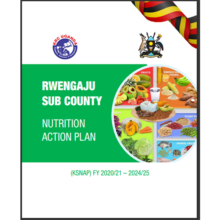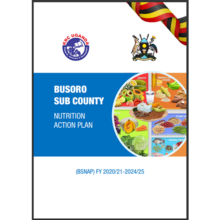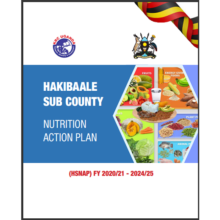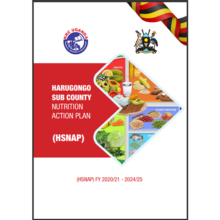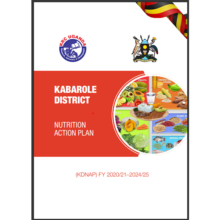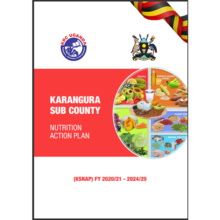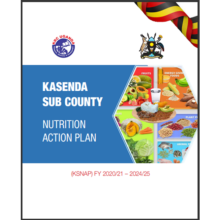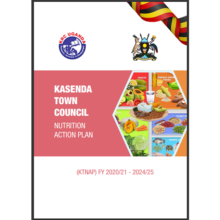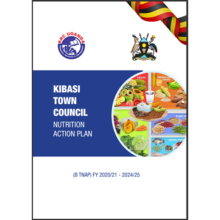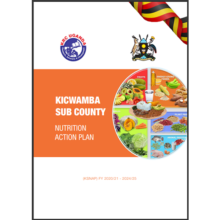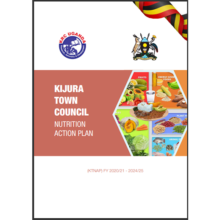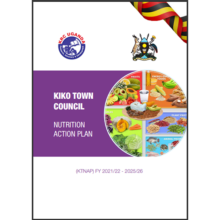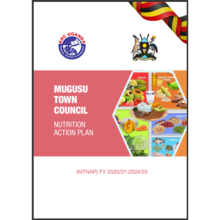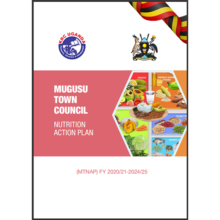Publications
Innovating to compete Smallholder farmers agency and markets in East Africa
… click to read publication
Making the Warehouse receipt system accessible to small holder farmers as a strategy to address storage financing and marketing problems
… click to read publication
Taking Stock. Uganda Food Change Lab. Planning for a Sustainable Food System in The Face of Rapid Urbanisation
…click to read publication
The First Fort Portal Food Systems Lab FSL Phase IV Workshop 2020
…click to read publication
The Fort Portal Food System Lab
…click to read publication
Uganda Food Change Lab. Planning for the future food system of Kabarole District
… click to read publication
Bananas. Uganda’s cash machine
… click to read publication
Community Perception on the burden of malnutrition and child stunting Sept 2021
… click to read publication
Fort Portal System Lab Blog Magazine 2022
… click to read publication
Growing Cities Increasing Food Safety Challenges. Case study of Fort Portal Tourism City 2021
… click to read publication
The Rwenzori Regional and National Inventory of Maize Traders
… click to read publication
Making the Warehouse receipt system accessible to small holder farmers as a strategy to address storage financing and marketing problems
… click to read publication
Environment , Energy and Climate Change
Briquettes Making Training Report
…click to read publication
Briquettes Market Study and Marketing Strategy
…click to read publication
Climate Change Week Report 2016
…click to read publication
Development Response to Displacement Impact Project DRDIP Info pack
…click to read publication
Enhancing the adaptive capacity of communities to climate change through IWRM Mpanga Catchment of the Nile Basin in Uganda
…click to read publication
Gender Perspectives in adoption of Lorena cooking energy
…click to read publication
Is art the answer to communicating about climate change
…click to read publication
The PROSPERS Model Story. What beneficiaries say
…click to read publication
Governance & Policy Advocacy

World Refugee Day 2024: KRC-Uganda’s Commitment to Honoring Refugees in Bidi Bidi Settlement
A person is considered a refugee under the 1951 Refugee Convention if they have fled their place of origin due to well-founded fear of persecution based on their ethnicity, political beliefs, religion, or other characteristics. This definition also extends to individuals who have been displaced by man-made or natural disasters. World Refugee Day is observed on June 20th of each year as a way to honor the bravery and tenacity of the millions of refugees who have been forced to flee their homes because of war, persecution, or natural catastrophes. The theme “Hope Away from Home” is particularly relevant in 2024 as it highlights the resilience refugees demonstrate despite being far from their original homes. It underscores the importance of instilling hope in refugees, even when they are displaced from their home countries. Hope is a powerful force that fosters perseverance and drives constructive change. At KRC-Uganda, we firmly believe that through our protection interventions, we have and continue to make a significant difference in assisting refugees overcome the traumas of displacement and help them thrive in their new communities by fostering conditions in which their rights are respected and they feel appreciated, supported, and hopeful. In an effort to make this year’s World Refugee Day a success, KRC-Uganda has teamed up with the International Refugee Agency—the UNHCR, the Office of the Prime Minister (OPM) and other implementing partners in Bidi Bidi and Rhino Refugee Settlements like World Vision, Plan International, HEKS EPER, ADRA, International Rescue Committee and Windle International among others. To provide hope and resilience to those displaced from their homes, KRC-Uganda is dedicated to promoting the rights of refugees, especially in terms of access to and utilization of land. We have also created spaces to showcase their stories and struggles to promote understanding and empathy between the host communities and the refugees. By utilizing its advocacy platforms, KRC-Uganda will galvanize public support for refugees by working with the Office of the Prime Minister (OPM), implementing partners, and private citizens to act and provide the necessary resources and opportunities for refugees to live with dignity and hope. As June 20th draws near, KRC-Uganda implores the government and all implementing partners to show their support for refugees by listening to their stories, meeting their needs, and acknowledging their contributions to host communities. By working together, we can ensure that refugees, even in distant places, can find hope and the possibility of a better future. By Francis Opio Peacebuilding Manager, KRC-Uganda
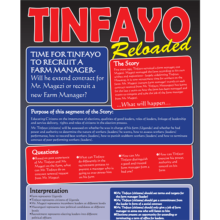
Tinyafayo II: Reloaded
The Story: Five years ago, Tinfayo recruited a farm manager, one Magezi. Magezi managed the farm according to his own wishes and aspirations – largely side linning Tinfayo. However, it is now recruitment time for workers on the farm: Mr. Magezi (current farm manager) travels to seek contract renewal from Mr. Tinfayo; Mucunguzi has learnt for the last 5 years on how the farm has been managed and wants to compete and take the job of the farm manager from Mr. Magezi. …What will happen… …. Click to Access Document
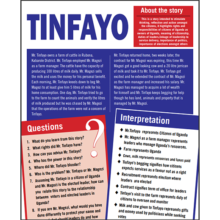
Tinyafayo: Civic Education
This is a story intended to stimulate thinking, reflection and action amongst the citizens, it highlights rights and responsibilities of citizens of Uganda as owners of Uganda, meaning of citizenship, duties of leaders, linkage of leadership to service delivery, importance of politics, importance of elections amongst others … Click to Access Document
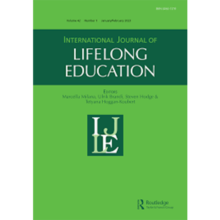
‘To engage or not to’: translating civic education to civic engagement
This paper draws from a broader study on citizenship education in Western Uganda to explain how civic education knowledge translates into civic engagement through people’s lived experiences. The paperaddresses two questions, that is the contextual understandings of civic education and civic engagement by the partner NGO. Secondly, what explains people’s decision to engage or not to engage. We employed critical research methodologies with multiple data collection methods as a means of empowering rural community members to dialogue with stakeholders in civic education. We present the findings based on three themes, that is rationality, power dynamics, and mutual interests. We draw on Rational Choice Theory to theorise reasons for civic engagement. We particularly argue that drivers for and against civic engagement are largely individual and driven by assumed benefits and losses. Individual assumptions can also translate to group or larger social conclaves based on common drivers, beliefs and interests. We conclude by noting that actors in civic education and awareness programmes ought to note that civic engagement is rooted in individual rationality albeit contextual. Click to Access Full Report
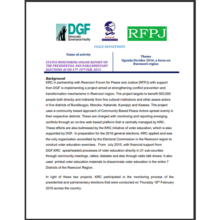
Status Monitoring Online Report on The Presidential & Parliamentary Elections as on 17th – 19th February 2015
KRC in partnership with Rwenzori Forum for Peace and Justice (RFPJ) with support from DGF is implementing a project aimed at strengthening conflict prevention and transformation mechanisms in Rwenzori region. The project targets to benefit 500,000 people both directly and indirectly from five cultural institutions and other peace actors in five districts of Bundibugyo, Ntoroko, Kabarole, Kyenjojo and Kasese. The project uses a community based approach of Community Based Peace Actors spread evenly in their respective districts. These are charged with monitoring and reporting emergingconflicts through an on-line web based platform that is centrally managed by KRC … click to access The Full Report
Conflict Prevention & Peace Building
Rwenzori Monthly Conflict Analysis Report July 2016
Rwenzori Monthly Conflict Analysis Report August 2016
… click to read publication
Commemorating the International Day of Peace. A working manual
… click to read publication
Bundibugyo Post Election Conflict Reconciliation Report
… click to read publication
Rwenzori Monthly Conflict Analysis Report June 2016
… click to read publication
Uganda Decides Rwenzori Region Election Observation Report 2016
… click to read publication
Kasunga III Conference Report 2008
… click to read publication
Kasunga II Conference Report 2007
… click to read publication
Kayanzi The Forgoten Village n Kasese District
… click to read publication
Rwenzururu Queen Vows to Push for Peace in The Rwenzori Region
… click to read publication
Presidential and Parliamentary Elections Report 2016
… click to read publication
Post Election violence interventions in the Rwenzori Region. 2016
… click to read publication
The Rwenzori Region Conflict Analysis Report 2021
… click to read publication
Six Years of Human Right Promotion Nov 2006
… click to read publication
Nutrition Action Plans

Identifying The Realities, Limitations And Drivers For Vegetables (Consumption And Production) In The Fort Portal Food System
In Fort Portal City, Western Uganda, the urban areas are experiencing a rise in food insecurity. Low-income urban consumers may lack the ability to store food and may struggle to afford fuel for cooking. Typically, they buy food every day from informal traders and street vendors. Traditional foods that require more time to prepare are losing out to ‘faster’ foods. An earlier study by KRC- Uganda in Fort Portal City also showed that food choices are undergoing constant change (relevant for indigenous food to new varieties and highly processed foods). The study aimed at identifying the bottlenecks in the Fort Portal Food system and detecting possible ways to trigger stakeholders to motivate them co-develop alternatives to enhance the access to healthy food, hence decrease the malnutrition in this fertile region. …click to read more

Contribution of Agroecological Farming Systems on Household Food Security & Nutrition Status in Karangura Sub County, Kabarole District
IDP together with KRC-Uganda, and RCA have been supporting farmers in promoting Agroecologicalpractices to enhance their food security and nutrition as one of the ways to promote the productionand consumption of healthy food. However, there is no data that indicates the contribution of theseagroecological farming practices to household food security and nutrition outcomes. KRC- Ugandaworked with IDP and Mountains of the Moon University to conduct a study on the contribution ofAgroecological farming practices to nutrition and food security outcomes among households inKarangura sub-county, Kabarole district. The purpose of this study was to assess the contribution of Agroecological farming systems onhousehold food security and nutrition status in Kabarole district. Specifically, the study aimed at:assessing the level of management and productivity of the farms of IDP supported households inagroecological practices and those that are not IDP supported; determining the Food ConsumptionScore among IDP supported households in Karangura Sub-county and those that are not; determiningthe household food security situation of IDP supported households and those that are not anddetermining the nutrition status of children aged 6-59 months in the IDP supported households andthose that are not. …click to read more
Researches
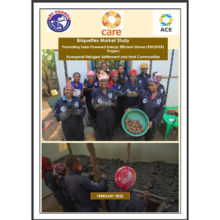
Briquettes Market Study Promoting Solar Powered Energy Efficient Stoves (PROSPER)
The following are the objectives of this strategyi. To ensure accessibility of quality briquettes for wider use at ease-of-reach pointii. To ensure affordability of quality briquettes by bringing down it priceiii. To create awareness and sensitize masses on feasibility of using quality briquettesiv. To support scaled up quality briquettes production as a panacea to bring down the pricev. Strengthening public private partnerships in quality briquettes production andmarketingvi. Integrate and mainstream cross-cutting issues in wider quality briquettes production (including women, children, persons with disability, reducing gender based violence, saving the environment from degradation as well as contributing to reduction of HIV/AIDS) … Click to access Full Report
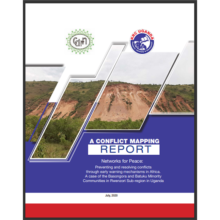
A CONFLICT MAPPING REPORT
This is a report of the Conflict Mapping for the Network for Peace: Preventing and ResolvingConflicts through Early Warning Mechanism in Africa Project being implemented in Kaseseand Ntoroko Districts located in the Rwenzori Sub Region of Western Uganda. The projectis jointly implemented by Community Development Resource Network (CDRN) and KabaroleResearch & Resource Centre (KRC Uganda) in Ntoroko and Kasese Districts respectively,with financial support from the UK aid in partnership with Minority Rights Group International(MRGI) …Click to access Full Report
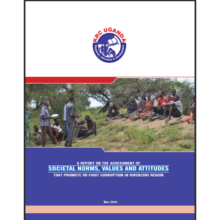
A Report on the Assessment of Societal Norms, Values & Attitudes that promote or fight Corruption in Rwenzori Region
This study sought to find out the societal norms, values and attitudes that promote or fight corruption in Rwenzori region. The study was commissioned by Kabarole Resource and Research Centre (KRC) with the funding from Democratic Governance Facility (DGF). The scope extended to include the eight districts (Kabarole, Kyenjojo, Bundibugyo, Ntoroko, Kamwenge, Kyegegwa, Bunyangabu, and Kasese) … Click to access The Full Report
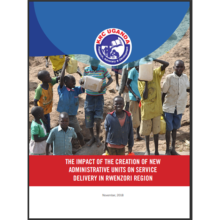
THE IMPACT OF THE CREATION OF NEW ADMINISTRATIVE UNITS ON SERVICE DELIVERY IN RWENZORI REGION
Kabarole Research Center (KRC), with funding from Democratic Governance Facility (DGF), is implementing a three year Civic Education Project in the Rwenzori region under the title “Enhancing People Power for Transformative Leadership in the 8 Districts of the Rwenzori region”. The project aims at achieving a civically competent citizenry with ability to demand for a more responsive and accountable state; to increase citizens’ knowledge on civil and political rights and to increase government capacity to respond to citizens demands. To achieve these aims, KRC conducted researches on pressing governance issues in order to generate evidence that can be used by citizens and leaders to make appropriate choicesand decisions in planning, policy formulation and effective implementation of development programs for effective service delivery at community levels. In this context, this research sought to interrogate the claim that decentralization and the creation of new administrative units have brought services closer to the people and empowered them through participation on the governance landscape. This is against the backdrop of the immense criticism leveled against the creation of new administrative units which pundits argue has laid a heavier burden onto the tax payer … Click to access The Full Report
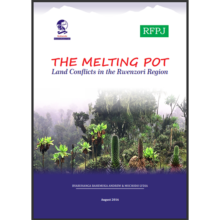
THE MELTING POT: Land Conflicts in the Rwenzori Region
This study examines the centrality of land in the conflict situation in the Rwenzori region of western Uganda. By exploring the factors underlying the incidences of land conflicts, the study derives vital implications of these conflicts to the region’s peace and security situation. The findings indicate that land remains at the centre of the prevailing conflict narrative in the Region. Notwithstanding the narratives that may mask land, such as references to ethno-political and sociolinguistic pluralities and antagonisms, land is the fulcrum around which these struggles revolve. Narratives like ethnic tensions have been researched and told time and again, thus masking the fundamental problem: land governance. Land conflicts tend to draw many different people and agencies into their fold, thus impacting on the peace and security measures and potentialities in the region’s entire community. The study proposes institutional and structural measures for overcoming these interlocking conflicts. …Click to access The Full Report
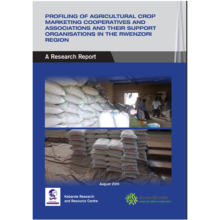
PROFILING OF AGRICULTURAL CROP MARKETING COOPERATIVES AND ASSOCIATIONS AND THEIR SUPPORT ORGANISATIONS IN THE RWENZORIREGION
The profiling study was conducted to document the status of marketing cooperatives andassociations in Rwenzori region with an objective to improve understanding of their scope andscale, the range of services they receive and offer with the associated terms and conditionsand in turn, determine how best to support them while improving the synergy of BD partnersand the food cluster members of the Rwenzori regional Development Framework …Click to access Full Report
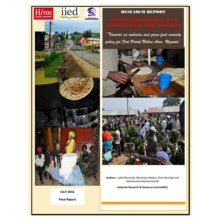
FOOD CONSUMPTION DYNAMICS OF THE URBAN POOR IN FORT PORTAL MUNICIPALITY
This report provides an analysis of the street food system in Fort Portal town . The study drawsattention to the consumption dynamics of the urban poor to bring new insights into the currentglobal food debate framed on population forecasts and the related production narrative.Through a consumer survey, interviews and focus group discussions with the urban foodvendors and the different consumer segments. The evidence suggests that food security andnutrition, particularly for the urban poor is not just about addressing food production … …Click to read The Full Report
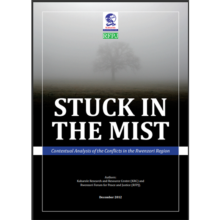
STUCK INTHE MIST: Contextual Analysis of the Conflicts in the Rwenzori Region
The Rwenzori region consisting of 7 districts (Kabarole, Kyenjojo, Kamwenge, Kasese, Kyegegwa,Ntoroko and Bundibugyo) of Western Uganda has for decades been characterized by conflicts associatedwith cultural and ethnic differences that exist among the people of the region. The conflicts betweencultural groups have always raised questions about governance; leadership and fairness in the sharingand use of natural resources e.g. land. Although the recent conflicts could have some connection withhistorical incidents in the region, they possess a distinguishable character of their own. The currentconflicts between ethnic groups have been triggered by the recent reintroduction and recognition ofcultural leadership. This recognition and facilitation by the government of Uganda resulted into there awakening of historical conflicts, the feeling of inequality between ethnic groups and the fearsthat certain cultural groups will have little or no share in the natural resources including the recentlydiscovered oil and gas. … Click to access Full Report
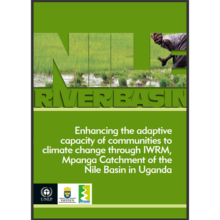
Enhancing the adaptive capacity of communities to climate change through IWRM, Mpanga Catchment of the Nile Basin in Uganda
The Project – supported by UNEP – was implemented in the upper Nile Basin, in Uganda. The Mpangacatchment where activities were rolled out is part of the Lake George Basin / The Lake Albert WaterManagement Zone and is located in the west of the country. This Mpanga catchment has an estimatedsurface of approx.4700 km2, and is characterized by a diversity of landscapes and high ecologicalsignificance. The area stretches over the territory of these 3 Districts. … Click to access Full Report
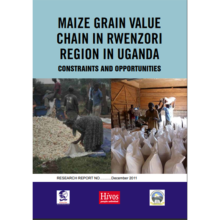
MAIZE GRAIN VALUECHAIN IN RWENZORIREGION IN UGANDACONSTRAINTS AND OPPORTUNITIES
The Rwenzori Regional Think Tank initiative brought together Rwenzori regional agriculture stakeholdersthat reflected on the challenges facing agriculture sector in the region. Research was seen as oneof the mechanisms through which knowledge can be generated to inform decisions and actions forimproving agricultural productivity. It was against this background that study to identify constraintsand opportunities in the maize grain value chain in Ruwenzori region was done. This research onmaize trade was conducted to provide a precursor for in-depth value chain analysis. A survey of buyersin the districts of Kyenjojo, Kabarole, Kamwenge, Kasese and Bundibugyo as well as Buyers inKampala was conducted. Data about trade volume and prices from 2007 to 2009 was collected. A totalof 399 buyers (stores and traders) in Rwenzori region and a total of key buyers in Kampala wereestablished. This big numbers of buyers include both small and large scale operating in the districtsof Kyenjojo, Kabarole, Kamwenge and Kasese. …. Click to access The Full Report
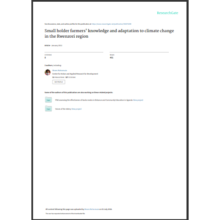
Small holder farmers’ knowledge and adaptation to climate change in the Rwenzori region
The Rwenzori region has in the past couple of years been on the local, national and international spotlight as a region already affected by climate change. Various studies in the Rwenzori region have indicated that agricultural products will be affected negatively by climate change. There is a plethora of reports and manuals about climate change adaptation and mitigation in climate change prone areas. Knowledge about climate change is an important factor in climate change mitigation and adaptation. This investigation aimed to investigate small holder farmer’s knowledge and their adaptation strategies in the Rwenzori region. …Click to access Full Report
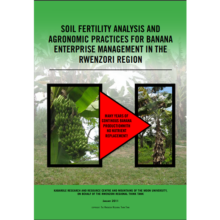
SOIL FERTILITY ANALYSIS AND AGRONOMIC PRACTICES FOR BANANA ENTERPRISE MANAGEMENT IN THE RWENZORI REGION
The East African highland banana (Musa spp. AAA-EA) is a primary food and cash crop in Uganda. Despiteits importance, yields on farmer’s fields remain poor in the region compared to that on research stations.Quantitative information on the status of soil fertility in banana land use, banana management practicesand their adoption and the sources of social capital in Rwenzori region have been scanty. Therefore,what follows below is a summary of research results, from a research that was carried out in traditionalbanana growing districts of Rwenzori region. The study was carried out by the Rwenzori regional ThinkTank, to find out the reasons for the declining productivity of bananas and suggest banana managementtechnologies that can be adopted by farmers with the purpose to increase banana productivity at smallholder farmer level. A sample of 357 banana farmers drawn from five districts of Rwenzori region andsurvey with a participatory Rural Appraisal (PRA) and Diagnostic Survey (DS) research design was usedto collect the data. … Click to access The Full Report
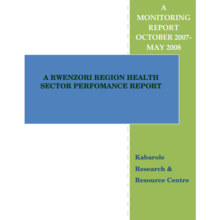
A Rwenzori Region Health Sector Performance Report
This report presents findings of a Health facility monitoring exercise conducted in four districts of the Rwenzori region. The main objective of the survey was to measure the effectiveness of government and private expenditure in the health sector. This was achieved by; analysing the impact of the strides taken by Government in bringing health services closer to the communities, establishing the effectiveness of the health facilities in responding to community health needs, identifying the perception and responsiveness of both health service providers and consumers towards the quality of health services delivered and it was also to draw feasible recommendations towards improving health service delivery … click to access The Full Report
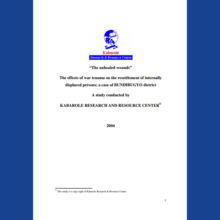
The effects of war trauma on the resettlement of internally displaced persons; a case of BUNDIBUGYO district
The Allied Democratic Forces (ADF) insurgence that took place in Western Uganda wasone of the more than forty violent conflicts that concurrently decorated the world map atthe turn of the century. The 180,000 people of Bundibugyo were part of a family of twomillion people world-wide who were displaced from their homes, but lived inside theborders of their homelands. The Bundibugyo Internally Displaced People (IDPs) thatlived in camps during the ADF war were the subjects of this study. Click to access The Full Report

